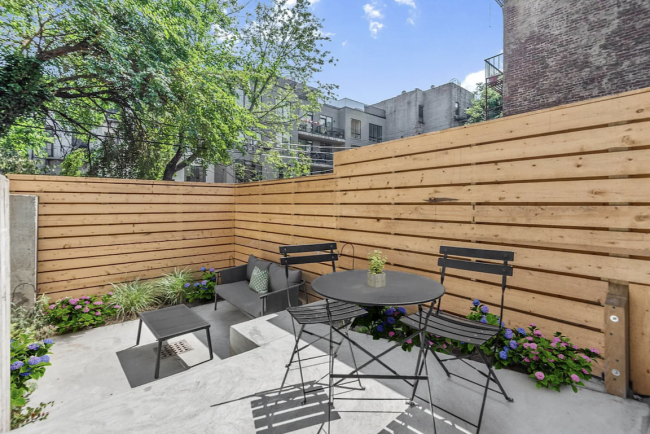Considering a ground-floor apartment? Here's what you need to know
- These units are typically cheaper and may have private outdoor space or a separate entrance
- You need to beware of noise, pests, and safety issues when buying a ground-level apartment
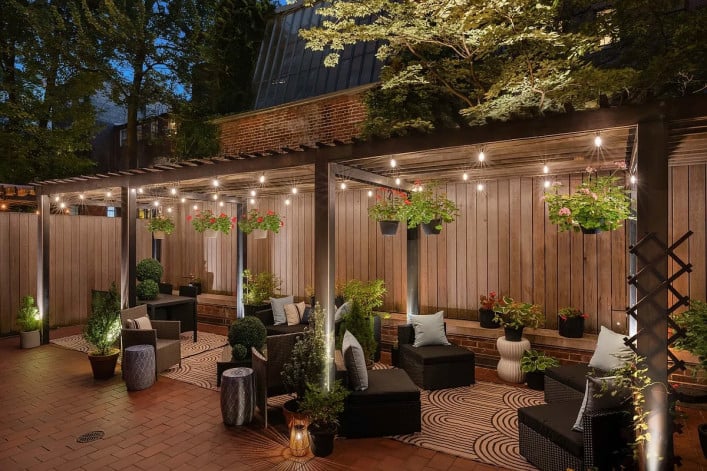
Private outdoor space is a big perk for many ground-floor units. A one-bedroom condo with a private, 900-square-foot terrace in Greenwich Village is asking $3.795 million.
It’s not just the fact that you can skip the stairs: Ground-floor apartments have many advantages over apartments on higher floors in New York City. But there are some disadvantages buyers need to be aware of as well.
On the plus side, these apartments are sometimes less expensive than units on higher floors and make more sense for New Yorkers with babies in strollers, dogs, or mobility issues. They also offer more privacy—you don’t need to share an elevator with your neighbors— and a backyard or deck provides an opportunity to expand your living space.
Still, the drawbacks can be deal-breakers for some: Ground-floor apartments can be more likely to have problems with insects and rodents. Depending on the location and configuration of your apartment, you may have to worry about passersby peering in. Street noise is also an issue.
In this Buy Curious, Jules Garcia, an agent at Coldwell Banker Warburg, and Tali Berzak, a broker at Compass, tell you everything you wanted to know about life on a building’s ground floor.
[Editor's note: An earlier version of this post was previously published in November 2024. We are presenting it with updated information for November 2025.]
The question:
I’ve heard a ground-floor apartment might be my best bet in terms of value. What do I need to know?
The reality:
It’s true that you can sometimes save money when buying a ground-floor unit, but that's not always the case—it varies widely by neighborhood, building, and layout.
Still, a ground-floor apartment can offer buyers, especially in high-end buildings, a considerable discount.
And at least some of these apartments can be as desirable as living on the top level. The location, streetscape, and environment around a building have as much to do with the quality of life in that unit as the building's own operational systems. Is it on a block that's crawling with tourists or club-goers? Proceed with caution.
However, if it's located on an entirely residential side street with no restaurants or bars to speak of, it can offer a European city-like experience.
On a more practical level, accessibility is a key feature for someone who may be less mobile or needs to come and go more frequently.
Here's what to consider when exploring street-level living in NYC.
What about pests and other concerns?
"This is completely building-dependent," Berzak said.
In a well-maintained building where trash storage is managed correctly and regularly cleaned, ground-floor residents shouldn't have pest issues, she noted. In contrast, the risk is increased if a building's maintenance is inconsistent or if the upkeep is uncertain.
"For garden-level units, having a sub-basement can actually be beneficial," she added. "It provides a buffer layer where building-level issues can be addressed before they impact the living space."
Though pests are not a given, Garcia encourages homeowners to take preventive measures to mitigate the possibility. "This is especially important if the unit has a private outdoor space and/or has windows near trash/recycling placement," he said.
Determining the placement of AC or HVAC condensers in relation to trash bins is also important. "The air intake from the units can impact indoor air quality outside of just questionable smells. It can mean increased allergy agitation," Garcia said.
The address really matters, too. For a building that's flanked by restaurants or bars, the volume of foot traffic and trash on the street will have a significantly greater impact and could ultimately attract more vermin and unpleasant odors.
Do your research and pay careful attention when visiting the apartments, both inside and out.
Should you be worried about people looking in?
You'll definitely need to watch out for looky-loos if you are in a street-facing unit. Even nosy neighbors may try to sneak a peek.
Parlor-floor units are actually raised a bit from the street, making them better than if you are on the same grade as the sidewalk.
In some cases, a good trade-off is to buy a unit at the back of the building. What you might sacrifice in natural light can be worth the privacy and quiet—and you might score a backyard.
"Although ground-floor units facing an interior courtyard or alley are not as accessible to the general public, there is still a concern that someone may be able to get unwanted glimpses of your home, yourself, and your daily activities," Garcia said.
That's where window treatments can help, whether curtains or blinds. Using reverse shades that start from the bottom will obscure the lower part of the window while leaving the upper portion open so light can stream in.
Other ways to boost privacy include installing frosted or smart-glass windows or, for a much less costly solution, applying one-way privacy films (either reflective or tinted) to the interior. Berzak said many developers pre-install the film as it allows light in but provides privacy during the day.
Both brokers recommended landscaping—such as tall hedges or planters (per Berzak)—as a natural visual and physical barrier.
Such was the solution at a "highly desirable" ground-floor unit at 242 Baltic St. in Cobble Hill, where Garcia represented the buyers. "Even though one set of windows faced the street, they still got great privacy and security through thoughtful landscaping and window gates," he said.
Will you need to be more concerned about break-ins?
Safety is a realistic issue with ground-floor units. They're the easiest access point—and when they are out of the sightline of passersby (such as in the side or back of the building), thieves gain some cover.
"Doorman buildings and virtual security systems mitigate this concern significantly," Berzak said.
The same can be said for street-level apartments with metal grates (as at 242 Baltic St., above); however, in some neighborhoods, you'd be limited due to landmark district rules, unless the grates were grandfathered, Garcia noted.
And Berzak said those unsightly window grates are usually removed during extensive renovations in favor of a modern security system with a quickly activated alarm, which is also the default deterrent for newer buildings.
Garci also pointed to cloud-connected systems that put control in the homeowner's hands, rather than just relying on an outside service. "I hear of few—if any—tales of ground-floor unit break-ins versus packages being stolen from non-doorman building lobbies," he said.
Will people ring your doorbell more often?
Probably. In smaller buildings (especially walk-ups), the ground-floor or basement-level apartments are often home to the super, so delivery people and new tenants might ring your bell under the assumption that you’re there to let them in or help them in case of emergency.
This nuisance can be mitigated by clearly labeling your buzzer and mailbox.
Will a ground-floor unit be noisier?
Generally speaking, sure. You are closer to the action than a unit on a higher floor.
This, of course, depends on the location of your apartment within the building. Are you near the entrance? If so, you may hear the building’s front door open and close each time someone comes or goes. If it's near the elevator, you may hear it ding every time it opens—and be privy to people’s conversations as they wait around for it to arrive—especially if your own door leads to the lobby.
As for upstairs-neighbor noise, it doesn't matter whether you are on the first or the seventh floor of a 20-story building. It really comes down to the quality of the building and the thickness of the walls. Generally speaking, prewar buildings tend to have better sound attenuation than post-war buildings and new developments.
Noise from outside is a potentially greater concern for street-facing units, whereas those toward the back of the building tend to be quieter.
Berzak said that “city quiet" windows—specialty soundproof windows—often featuring a secondary set installed on the interior—can significantly reduce street noise, even in commercial or high-traffic areas. "I've had clients purchasing co-ops facing the FDR who install city quiet windows and have no noise," she noted.
You can also limit your search to neighborhoods that naturally mitigate noise levels.
"Historic landmark districts like Brooklyn Heights, Cobble Hill, and Carroll Gardens have some of the most desirable ground-floor units on [residential] tree-lined streets," Garcia said. "Other cool neighborhoods that have similar streets are the Upper West Side and parts of the Upper East Side."
Should you be worried about flooding?
Unfortunately, storms in recent years have caused significant flooding in ground-level properties across the boroughs, as well as in amenity spaces that are often located on the sub-level, which aren't zoned for occupancy.
Like other issues, this very real concern is specific to the property and its surrounding neighborhood.
For properties with a garden level, having a basement or sub-level below is beneficial because that space becomes the primary catchment for water, Berzak said. What's more, ground-level water issues don't just arise from the street; they are also frequently caused by poorly maintained roof drainage.
"So if gutters or internal roof drains are not cleaned properly, water trickles down the back of the building and is visible first at the garden level," she explained. "Buyers should always review the building's maintenance history and ask specific questions about the drainage system."
Garcia echoed that advice: "Buyers need to not just look at the building's history during their due diligence but also how the neighborhood has fared through the major or even just notable storms NYC has faced."
For example, when considering units with basement access or a garden-level bonus room, he ensures the inspector places a serious focus on points of drainage. Other red flags include the presence of dehumidifiers or if the baseboards appear to have been recently painted or replaced, both of which could indicate a problem with flooding or ongoing moisture.
Many new-construction condo buildings now have plans to mitigate potential flooding; however, not all developers put enough thought into worst-case scenarios during the construction process. If you’re buying a property that is partially under grade, you should inquire as to whether there’s a plan in place for torrential downpours.
Here’s the city’s flood hazard map if you want to check if the area you are considering for a ground-level apartment is at high or low risk.
Are the prices actually lower?
The short answer is: Sure, but multiple factors are at play (as with all things in real estate).
While ground-floor units have conventionally offered a 5 to 20 percent discount on a comparable non-ground-floor unit in the same building, pricing also depends on whether the building has an elevator or is a walk-up. You also have to keep in mind the condition of the unit, as well as views, light, and layout—all of which can make it difficult to compare apples to apples.
According to Berzak, the price discount can be mainly attributed to two factors: Ground-floor units typically receive less natural light and can sometimes have lower ceiling heights than units on upper floors. "An exception to this rule would be a classic garden duplex with a finished cellar, where the added size and private garden space can justify a higher price point than a basic single-floor unit," she noted.
But duplexes aren't the only outliers. "Ground-floor units with proper private outdoor spaces can easily transact at above-asking prices, as can those in historic districts or a prestigious zip code," Garcia said.
Besides price, are there any other pros?
Definitely.
"The benefits often address practical, daily needs—not climbing stairs in a walk-up, for example, is a huge one," Berzak said.
Indeed, plenty of New Yorkers eschew larger buildings with door attendants and elevators but find themselves no longer willing or able to bound up three flights, whether due to mobility issues or the need to carry strollers. Dog owners also appreciate the convenience of popping in and out for walks—and avoiding neighbors who don't enjoy sharing a small elevator with your four-legged family members.
Another very real benefit for people with pets or young kids is that they don't have to worry about fielding noise complaints from downstairs neighbors, Garcia said. And those "who observe restrictions on using elevators on certain days often prefer a lower, if not ground-floor, unit to observe their religious practices sustainably."
Outdoor space is another huge potential perk. Not every ground-floor unit has it, of course, but many do. "The possibility of private outdoor space, such as a garden or patio, is a major luxury in dense Brooklyn and Manhattan neighborhoods," Berzak said.
Another nuance of ground-floor living with a backyard is that there may be unused air rights, some of which you could potentially purchase from the co-op or condo board and then expand your unit into the backyard, provided you follow the setback requirements. This scenario is helpful in historic districts where existing buildings cannot be razed and rebuilt.
And at least when it comes to the lower (parlor) level of a multi-family brownstone, which is the space where visitors were once received, you are often getting the highest ceilings and the most original character.
What’s the deal with maisonettes?
A ground-level unit that has been dubbed a “maisonette” typically has its own private street entrances, affording you more peace and privacy than most ground-floor units, and multiple floors. These residences also often have outdoor spaces.
"It's like getting the perks of a NYC townhouse while still having the security of a larger building, which helps defray/outsource maintenance," Garcia said.
He noted that maisonettes with multiple floors in newer developments are often billed as "townhouses" despite not being standalone structures (a technical requirement), as this helps to command a higher price point.
Buyers considering maisonettes should also investigate the unit's history, as some have been converted from office spaces or doctors' offices. In these instances, you will want to ensure the conversion work is all to code, "and whether the sometimes funky layouts are livable for now and will afford long-term value," he said. "Just because you, as a buyer, can get over some things doesn't mean potential future buyers will." Read: You may need to renovate before ever selling.
Do ground-floor units sound like a fit? Check out these five apartments on the market.
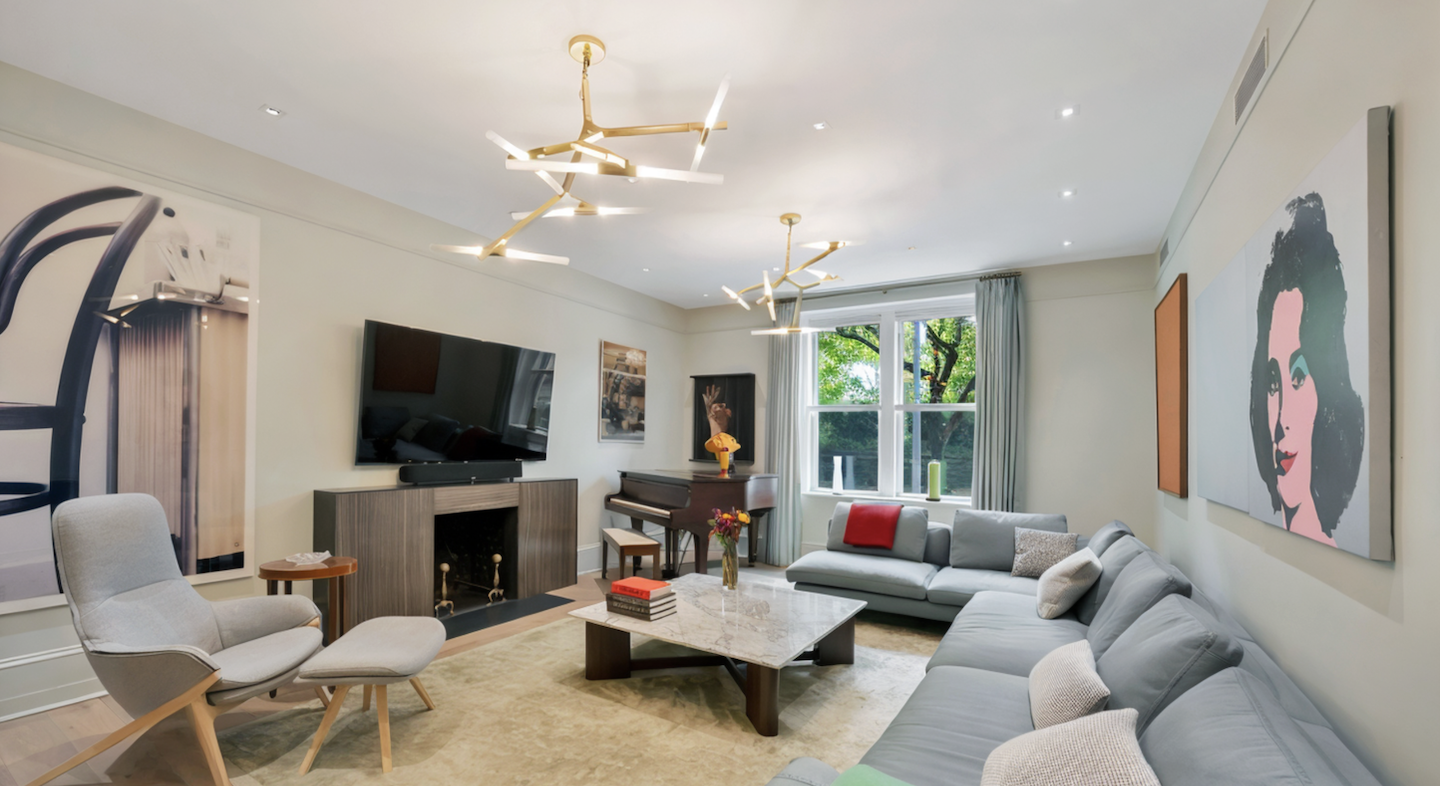
1148 Fifth Ave., Parlor A, Carnegie Hill
Situated on an elevated parlor-level floor several steps above the building's lobby and well above street-level viewing, this four-bedroom, three-and-a-half-bath residence was fully renovated by an architect for his family. Highlights include bleached white oak floors, an integrated sound system, library/media lounge, dining room with a built-in bar, and living room featuring 10-foot ceilings, marble fireplace, and large windows framing Central Park. A chef's kitchen with high-end appliances offers pantry closets, custom cabinetry, and a marble island. Amenities at 1148 Fifth Ave., which dates to 1923 and has 59 units on 13 stories, include full-time door staff, a resident manager and porter, fully equipped fitness center, bike room, and assigned storage. The apartment is listed at $3,695,000 with a monthly maintenance fee of $7,225.
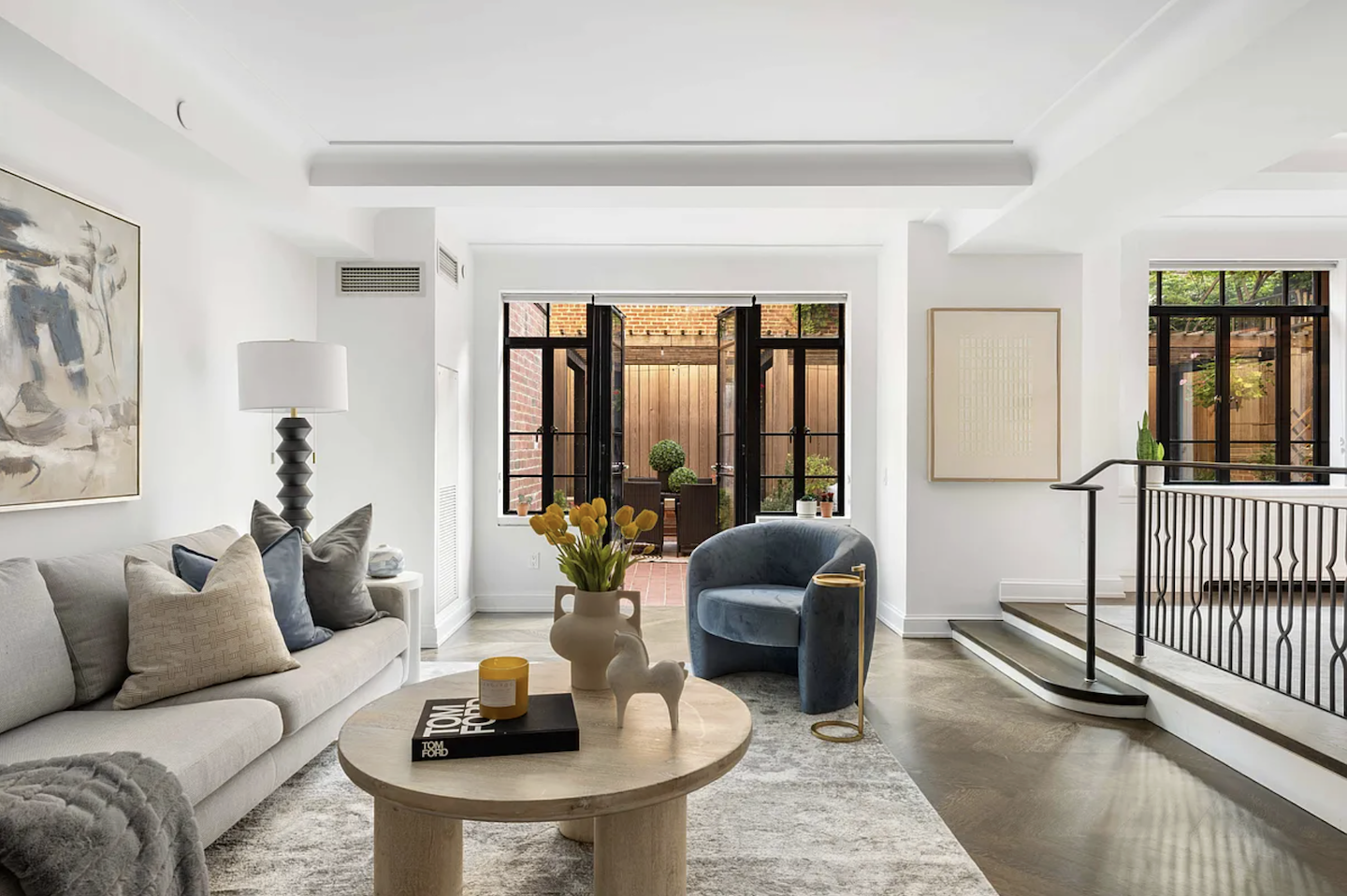
130 West 12 St., #1A, Greenwich Village
This 1,500-square-foot condo is on the market for $3.795 million, with $3,431 in monthly common charges and $2,759 in monthly taxes. It features a sunken living room that opens directly onto the private 900-square-foot, south-facing garden, and a primary bedroom with a walk-in dressing room leading to a spa-style bath with a windowed soaking tub, double sinks, separate windowed shower, and radiant-floor heating. The renovated 1941 building is in a historic district and has 42 units on 13 floors. It offers a full-time doorman, live-in superintendent, landscaped roof terrace, windowed gym, private storage, and access to the Greenwich Lane Wellness Center, with gym, 25-meter pool, hot tub, and steam room.
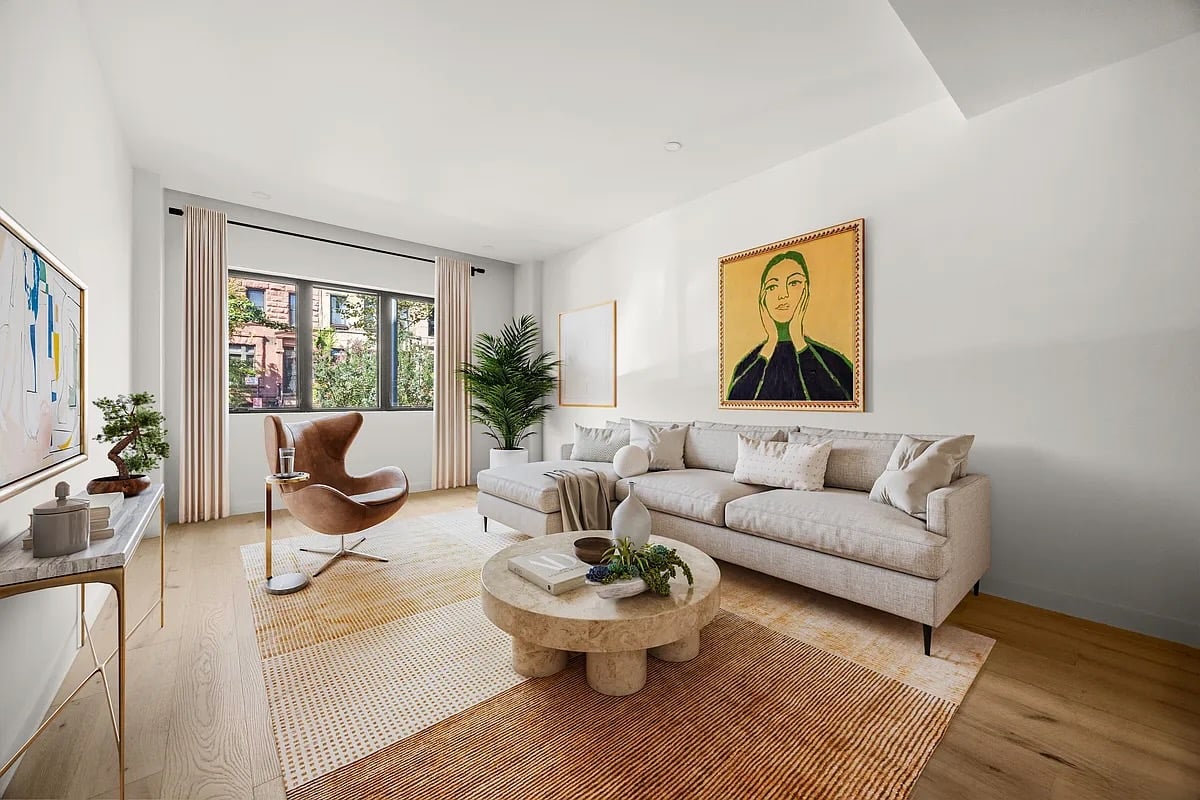
654 Jefferson Ave., #1B, Stuyvesant Heights
A sponsor unit, this brand new, 1,500-square-foot, two-story condo is listed at $1.259 million. It features two bedrooms, two and a half bathrooms, a chef's kitchen with natural stone countertops and custom cabinetry, central air, oversized windows, and private 550-square-foot fenced-in backyard. The lower level has nine-foot ceilings, a private entrance, a washer/dryer room, and a powder room. Monthly common charges are $424; monthly taxes are $303. Each of eight units at the four-story building, completed in 2025, comes with deeded storage and a rooftop cabana.
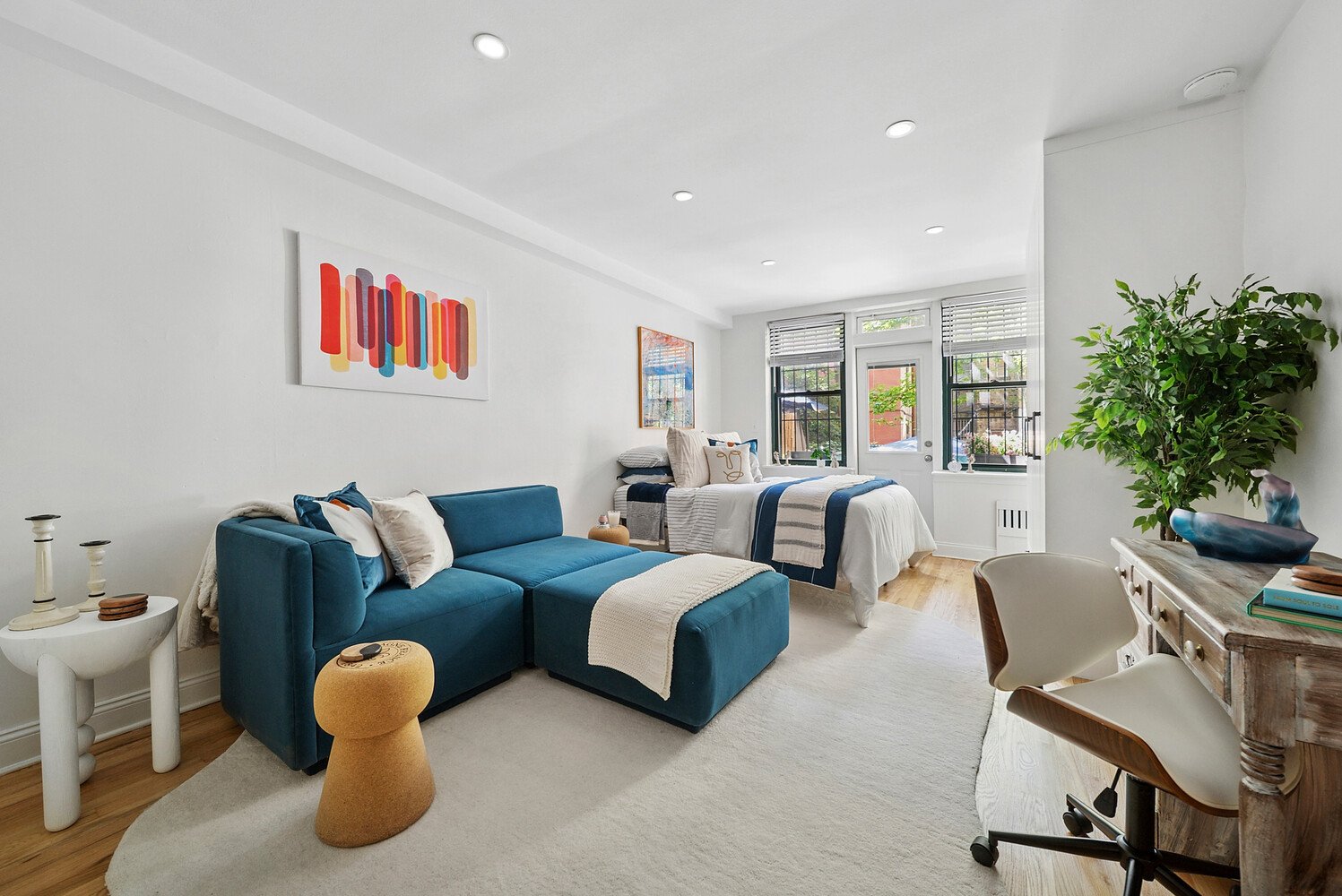
212 East 77th St., Lenox Hill
This fully renovated studio co-op is now on the market for $479,000, with monthly maintenance costs of $1,396. It features an updated kitchen with stainless steel appliances, including a dishwasher, high ceilings, hardwood floors, and private 300-square-foot garden. Built in 1950, the five-story, 39-unit building offers a secure double-locked door entry with intercom, live-in super, bike room, laundry room, and assigned storage space.
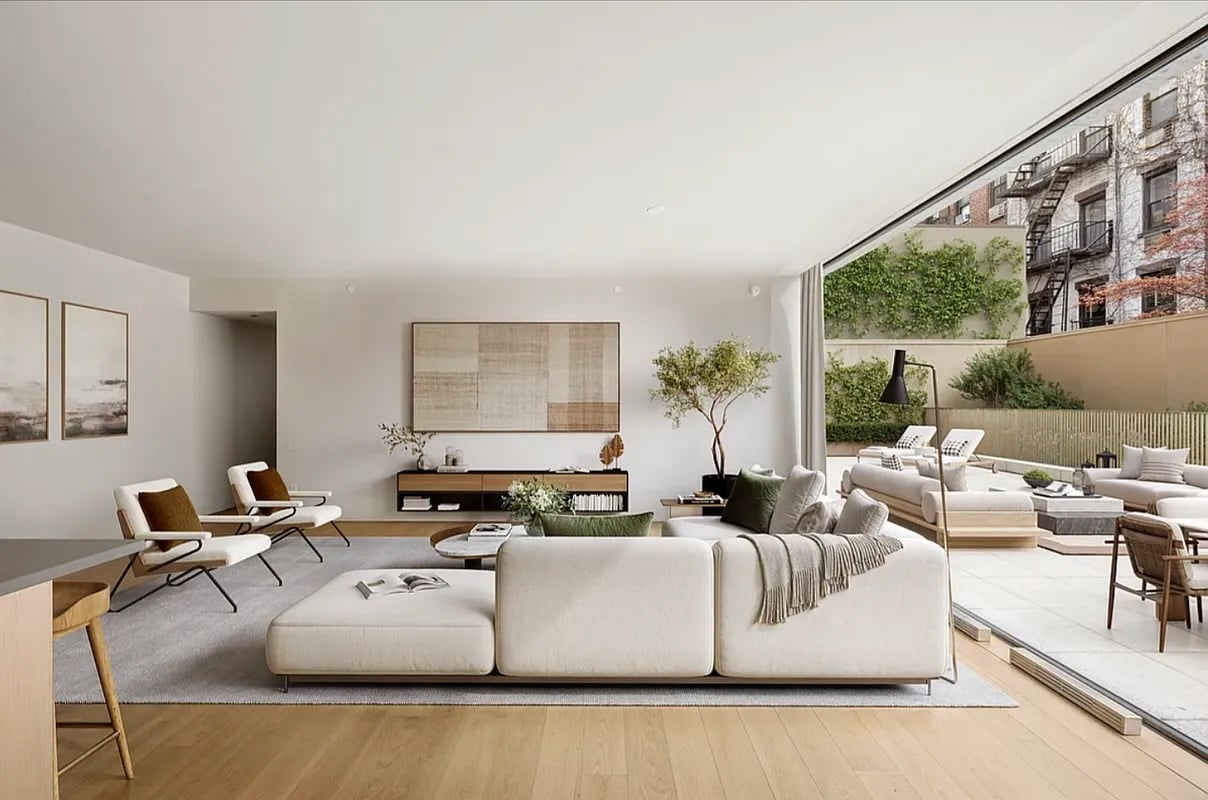
251 West 14th St., #1A, Chelsea
Located in The Elisa, a luxury 11-story, 25-unit condo completed in 2022, this brand new two-bedroom, two-and-a-half-bathroom maisonette has 1,624 square feet of interior living space and a private 945-square-foot terrace—making it the largest two bedroom in the building. It is asking $3,500,000. The unit features oak floors, nine-plus-foot ceilings, an entryway with a coat closet and powder room, and an open-concept living room, dining room, and Boffi-designed kitchen. Building amenities include a full-time door attendant, fitness club, rooftop garden, bicycle room, common laundry room, and private storage available for purchase.
—Earlier versions of this article contained reporting and writing by Leah Hochbaum Rosner.
You Might Also Like
The Agency's Off-Market Advantage
Discover off-market properties in your dream neighborhood that perfectly suit your needs and budget. Meet and deal with sellers before their apartment hits the market.

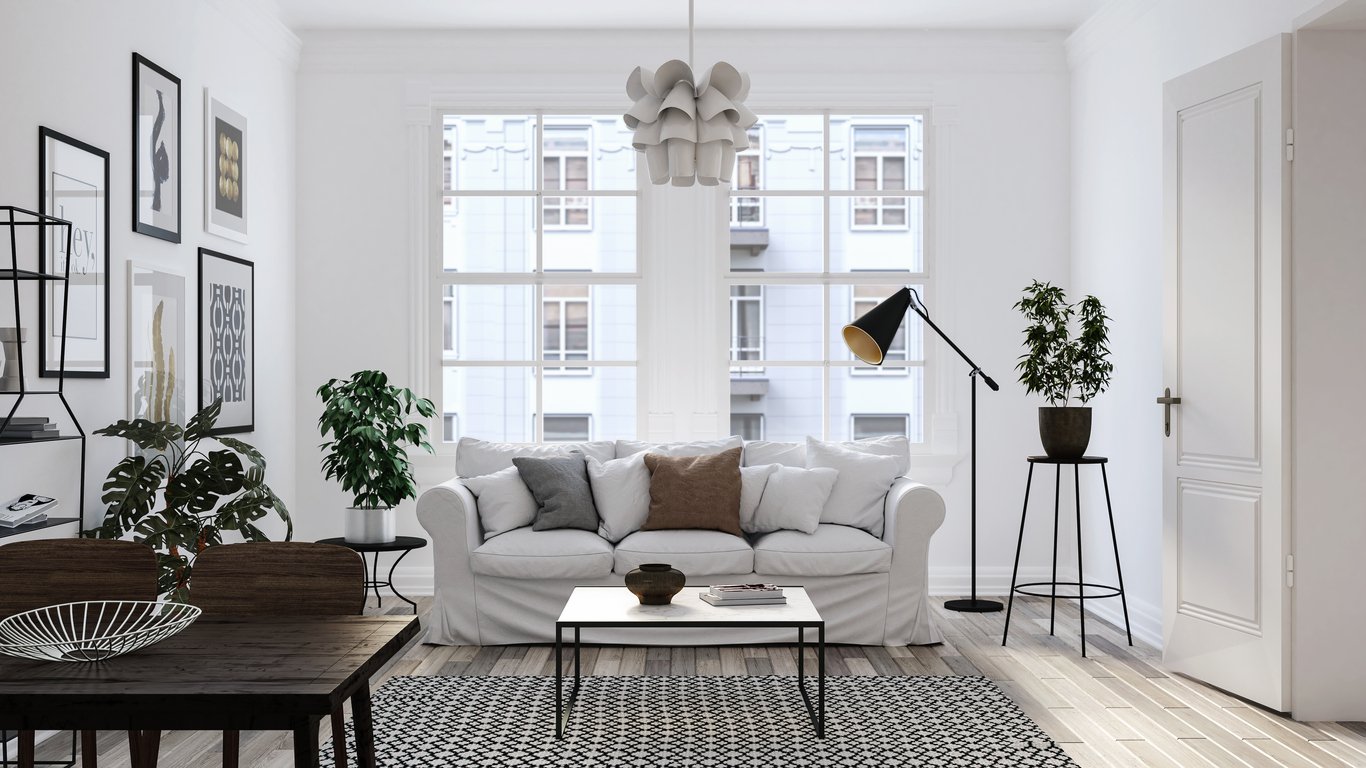
Let The Agency's off-market team give you exclusive access to apartments in your price range and desired neighborhood that no one else has seen. More options, less competition, no bidding wars.




















